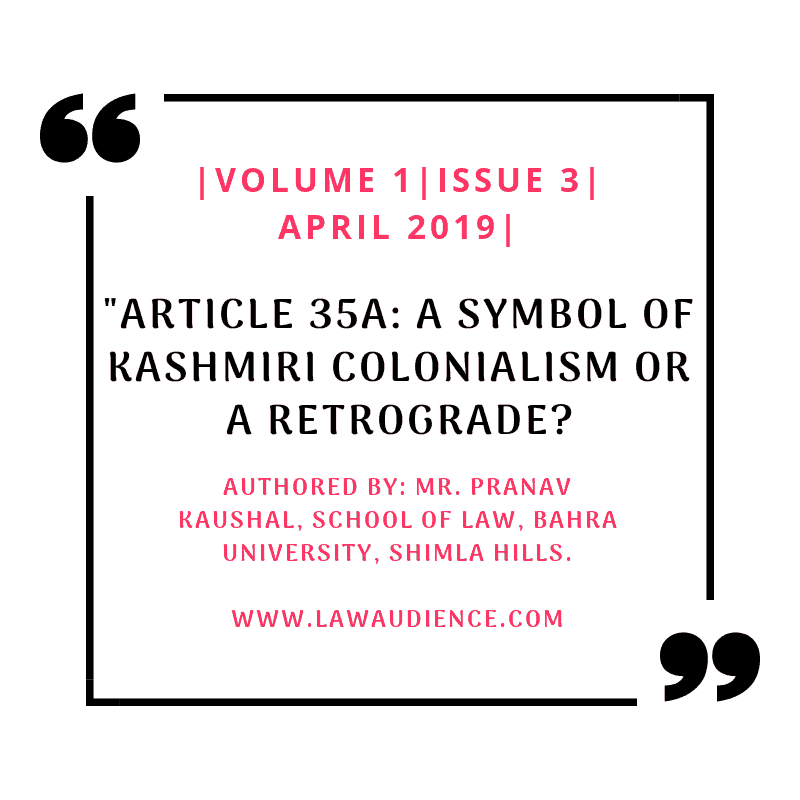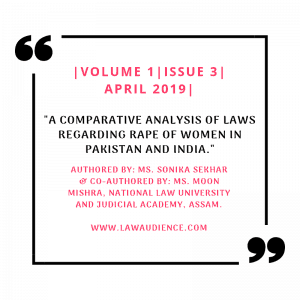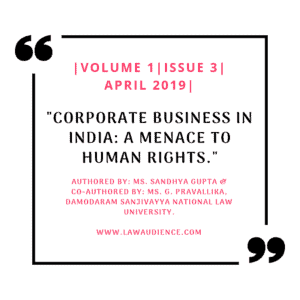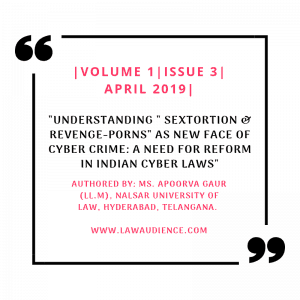AUTHORED BY: MR. PRANAV KAUSHAL, SCHOOL OF LAW, BAHRA UNIVERSITY SHIMLA HILLS.
I. ABSTRACT:
“Is Article 35A of the Indian Constitution is a symbol of Kashmiri Colonialism or a Retrograde? Article 35A of the Indian Constitution has been remarked as the symbol of Kashmiri Colonialism over the rest of Jammu and Kashmir. In a memorandum, the Jammu Kashmir People’s Forum to the Union Minister and Human Rights Commission they stated that with the repeal of Article 35A of the Indian Constitution, fundamental rights have been legally snatched by the State which may include the Right to vote, right to property, right to marriage, right to employment etc. On the other hand Article 35A, the symbol of Kashmiri Colonialism is retrograde as it violates the concept of equality enshrined under the Indian Constitution.
The provision, as well as the ambit of Article 35A, is against the principle of gender equality, as Article 6 of Jammu and Kashmir Constitution[1] which derives its power from Article 35A, discriminates against women residents of the state who marry a person outside the state. Article 35A treats the non-permanent residents of the Jammu and Kashmir as second rate citizens. Thus, the provision of Article 35A violates the mandate of equality enshrined under the Preamble and under Article 14 of the Indian Constitution.[2]
This paper tries to explain that “Whether Article 35A is a symbol of Kashmiri Colonialism or a Retrograde” and also elucidates a brief study of Article 35A with Article 14 of the Indian Constitution.”
KEYWORDS: Article 35A, Article 370, Equality, Permanent Kashmiri Resident, Non-Kashmiri Resident.
II. INTRODUCTION:
“Indian Constitution establishes a form of asymmetric federalism, in which some states enjoy greater autonomy over the others”- Louise Tillin[3]
Should Article 35A of the Indian Constitution be struck down? These were the questions that were raised in the petition filed before the Honourable Supreme Court of India by a Delhi based Non-Government-Organisation. A large number of political activities have attributed instability within the State of Jammu Kashmir. If one looks out the factors behind such instability, the historical roots can be drawn out from the circumstances, when Maharaja Hari Singh acceded to India and Pakistan attempt to annex the whole State (Jammu Kashmir).
Also, Article 370, as well as the Article 35A, of the Indian Constitution has been considered as a contributing factor for the instability within the State of Jammu and Kashmir. Article 370 of the Indian Constitution was inserted in order to define the applicability of the Indian Constitution within the State of Jammu and Kashmir until the constitution of the State was finalised.
The Government of India in the year 1950 had clarified the effect of Article 370 in the following words:
“The Constituent Assembly will be constituted and will make recommendations that will either abolish Article 370 or will apply the same with some modifications and with certain exceptions.”
Article 370 was embodied under Part XXI of the Indian Constitution which relates to the temporary, special and transitional provision of the effect of ‘Article 370’. However, in unprecedented events, the Constituent Assembly was dissolved on dated 25th January 1957 without making any recommendations for the abrogation of Article 370 leaving behind the permanent fixture of Article 370, despite being titled as ‘Temporary Provision’[4] in the Indian Constitution.
In the year 1954, the Constituent Assembly had ratified the State’s accession to India and Article 35A was inserted in the Constitution of India as part of the (Application to Jammu and Kashmir) Orders 1954 promulgated by the President of India on the recommendation of the Constituent Assembly, imposed under Article 370. Article 35A confers power to the State legislature to make the special provision for the permanent residents of Jammu Kashmir and for that purpose Article 35A has been inserted under the Indian Constitution. Thus, the Presidential order of 1954 and Article 35A, in turn, provides the State of Jammu and Kashmir with special status and debar other Indians from acquiring properties within the State of Jammu Kashmir.
However, this Article 35A empowers the Jammu and Kashmir not only to classify the person constituting ‘Permanent Resident’ but also allow the government to confer on the person classified as Permanent Resident with special rights and privileges in matters related to the employment and acquisition of immovable properties within the State of Jammu and Kashmir. The Constitution of India has been considered as the social document in which all precious jewels such as the Fundamental Rights, Directives Principle of State Policy, Fundamental Duties and Power and Functions of different organs of the government are defined. Right to Equality is the bedrock of the Indian Constitution. As Article 35A had been born out from the Presidential Order of 1954, it was added to the Indian Constitution without undergoing to the procedure mentioned therein Constitution.
The Presidential Order was issued in pursuance to the power exercised under Article 370 (1) (d) of the Indian Constitution. Can such power be exercised for inserting new Articles under the Indian Constitution?
III. ARTICLE 35A: SYMBOL OF KASHMIRI COLONIALISM:
Article 35A of the Indian Constitution has been remarked as the symbol of Kashmiri Colonialism over the rest of Jammu and Kashmir. In a memorandum, the Jammu Kashmir People’s Forum to the Union Minister and Human Rights Commission they stated that with the repeal of Article 35A of the Indian Constitution, fundamental rights have been legally snatched by the State which may include the Right to vote, right to property, right to marriage, right to employment etc. It is a matter of concern and disgrace that the non-residents of the Jammu and Kashmir are subjected to the worst conditions and forms of Human rights abuse.
As per the norms of the state of Jammu and Kashmir, the certificates for the permanent resident are just like Hitler’s rule which is shameful and large masses in India are ignorant of such provision. In a situation, if the prospect of Article 35A has been struck down by the Supreme Court, it would have brought all political, religious and activist groups together to have traditional war with each other for the protection of Article 35A.
In support of Article 35A all the different groups such as People’s Democratic Party (PDP), Congress Party and members of Hurriyat had come together to support the most regressive Article in the Indian Constitution i.e. Article 35A. It was the leader of the PDP Party Mehbooba Mufti who first warns the centre for the dire consequences if Article 35A has been scrapped down.[5]
On the other hand, Farooq Abdullah said, “Kashmiris will make you forget the upheavals of the Amarnath movement when they rise up against nullifying of Article 35A. Thus, it appeared that Article 35A of the Indian Constitution is used as a symbol of Kashmiri Colonialism and an instrument of nefarious acts in Jammu and Kashmir.
IV. ARTICLE 35A IS RETROGRADE:
Article 35A the symbol of Kashmiri Colonialism violates the concept of equality enshrined under the Indian Constitution. The provision, as well as the ambit of Article 35A, is against the principle of gender equality, as Article 6 of Jammu and Kashmir Constitution which derives its power from Article 35A, discriminates against women residents of the state who marry a person outside the state. Article 35A treats the non-permanent residents of the Jammu and Kashmir as second rate citizens.
These non-permanent residents cannot buy immovable property in Jammu and Kashmir, not eligible for the employment by the state government, cannot avail the benefits of the scholarships and other grants offered by the state government, cannot contest elections and last but not the least cannot redress in any court. Most importantly, it is the Article 35A which deters the corporate sector from making any investment within the state of Jammu and Kashmir and state has to depend upon the Central Government for the financial assistance. The provision of Article 35A violates the mandate of equality enshrined under the Preamble and under Article 14 of the Indian Constitution. Article 35A discriminates against women residents of the state, who marries a person from the other state. The children born out from such wedlock are not entitled to have the Permanent Resident Certificate and other benefits such as right over the immovable property, grants and scholarships and employment in the government sector. The same rules and provisions do not apply to the offspring of a male who marries a woman from another state. The provision of Article 35A has been challenged before the Honourable High Court of Jammu and Kashmir by Parabhjit Kaur Modi, who has been continuously living and working in the state of Jammu and Kashmir after her marriage along with her husband who was the non-resident of Jammu and Kashmir. She pleaded that Article 6 of Jammu and Kashmir Constitution is ultra vires as this is against gender equality.
The law secretary Mohammad Ashraf Mir said that “Her children are the children of her husband who is from a different state and are not entitled to the permanent resident certificate or the benefits thereupon.[6] It is also grotesque of justice that many of the groups who have been staying in the state for a generation have also been denied the permanent status and with all its attendant benefits. In the May 2017, a petition has been filed by Charu Wali Khanna, a lawyer and former member of the National Commission for Women, that Article 6 of the Constitution of the Jammu and Kashmir supersedes her children from the basic rights such as the right to education, right to residence and right to get employment.
So it can be inferred that under the guise of Article 370 and Article 35A of the Indian Constitution, the men and women are subjected to different treatment which is against the mandate of equality enshrined under the Indian Constitution. Therefore Article 35A is retrograde, unconstitutional and deserves to be declared as invalid.[7]
The Supreme Court in the case of E.P Royappa v. State of Tamil Nadu[8] has given a dynamic connotation to the equalising principle contained in Article 14 of the Indian Constitution. The court declared equalising principle under Article 14 as “Founding Faith” a way of life and for that reason, it must not be subjected to narrow pedantic and lexicographic approach.
Justice P.N Bhagwati and Justice Krishna Iyer propounded the new concept of equality and observed that “Equality is a dynamic concept with many aspects and dimensions and it cannot be cribbed, cabined and confined with traditional and doctrinaire limits. From a positivistic point of view, equality is antithetic to arbitrariness. In fact, equality and arbitrariness are sworn enemies; one belongs to the rule of law in a republic while the other to the whim and caprice of an absolute monarchy. While an act is arbitrary it is implicit in that it is unequal both according to the political logic and constitutional law and therefore is violative of Article 14.”
Should Article 35A should be scrapped down, then Article 6 formulated by Jammu And Kashmir Assembly will be held as ultra vires as this Article 6 along with Article 35A of the Indian Constitution blocks the inflow of people from other parts of the country into the state of Jammu and Kashmir. After the abrogation of Article 35A, the State of Jammu and Kashmir will be treated like other states of India which will altogether lead to the complete integration of the state with the Union of India. Article 35A has been imposed as a sense of exclusiveness and separation from the rest of the country, but this Article 35A has led to the sphere of religious extremism and violence against Non-Permanent Residents of Jammu and Kashmir.
Altogether we can say that Article 35A is that Article which acts as a blockade to the holistic development of the State of Jammu and Kashmir. It has created an atmosphere of constitutionally approved apartheid thereby giving special powers to the ruling elite of the Jammu and Kashmir and on the other hand, this power is being abused against the women and non-residents of the Jammu and Kashmir. If Article 35A has been scrapped down then it would bring peace and prosperity in nature’s called state i.e. Jammu and Kashmir.
V. CONCLUSION:
“The people of Jammu and Kashmir are still poor and no one is benefitting from Article 35A and Article 370 of the Indian Constitution, whether they are Muslims or Hindus.”
In the modern world, with the advancement of technologies and advancement in the thought process, the regressive laws have been shrinking. For instance, it took decades to get rid of the evil and ignominy of Triple Talaaq, a pernicious custom, whereby the Muslim male could divorce his wife by saying three golden words according to their custom i.e. Talaaq, Talaaq, and Talaaq. In this regard, the Muslim community termed the judgment as an attack on their custom and faith.
It is the time for India to move on and held against firmly against the threats from the religious power brokers. The deletion, modification and addition to any part of the Indian constitution are subject to an amendment to the Constitution. The power to do so has been laid down under the Indian Constitution[9].
It is a fact that Article 35A of the Indian Constitution has never been formulated by the procedure as therein mentioned under the Indian Constitution. The Senior Advocate of the Supreme Court and Former Union Minister Jagdeep Dhankar made a remarkable point in his address at the function organised by the Nehru Memorial Museum and Library in September 2017 that Article 35A is an Article which outrages every word of the Preamble of the Constitution of India.[10]
The time has come to give justice to the victims of Article 35A. The victims include the women and Non-Permanent residents of the Jammu and Kashmir who have been infringed with one of the most Fundamental rights that is Right to equality which has been considered as the bedrock and foundation stone of the Indian democracy. It is for the good and better interest of the people that Article 35A should be abrogated as it has been considered as a hurdle in the way of the development of the state and its total integration with the union.
It is a high time to repeal Article 370 and Article 35A of the Indian Constitution in order to preserve and secure the equality clause enshrined under the Indian Constitution. If it leads to a long struggle to preserve and secure the basic character of the Indian constitution, ‘Then We the People of India must go through the struggle. For the good and better interest of the people of India and for the resident of Jammu and Kashmir, Article 35A must be repealed as it acts blockade in the social, economic and political regime of the State of Jammu and Kashmir.
“Law and Order exist for the purpose of establishing justice and when they fail in this purpose they become dangerously structured dam that blocks the flow of social progress”[11].
[1] Article 6, Constitution of Jammu and Kashmir, 1956.
[2] INDIA CONST. art. 14.
[3] Louise Tillin Is a Lecturer in Politics at the King’s India Institute.
[4] Nirmal Ghorawat, Article 370: A Primer, pgurus (Feb. 23, 2019, 10:04 AM), https://www.pgurus.com/article-370-primer/.
[5] Mehbooba Mufti, If Article 35A Tinkered With, There Would Be No One In Kashmir To Hold The Tricolour, Financial Express (Feb. 25, 2019, 10: 30 AM), https://www.financialexpress.com/india-news/nobody-will-protect-tricolor-in-kashmir-if-constitutional-status-changed-mehbooba-mufti/783824/.
[6] Ahmed Ali Fayyaz, Jammu And Kashmir State- Subject Law on Property Rights Challenged Afresh in High Court, The Hindu (Feb. 25, 2019, 10: 35 AM), https://www.thehindu.com/news/national/jk-statesubject-law-on-property-rights-challenged-afresh-in-hc/article5431349.ece.
[7] Vijay Kranti, Article 35A is Almost Like Apartheid, Sunday Guardian Live (Feb. 25, 11: 00 AM), https://www.sundayguardianlive.com/news/10755-article-35a-almost-apartheid.
[8] A.I.R. 1974 S.C. 555 (India).
[9] INDIA CONST. art. 368.
[10] Governor Jagmohan, Article 35A Must Go From the State, The New Indian Express, (Feb. 25, 2019, 11: 30 AM), http://www.newindianexpress.com/nation/2017/sep/03/article-35a-must-go-from-state-former-jammu-and-kashmir-governor-jagmohan-1652047.html.
[11] Letter From Birmingham Jail [Martin Luther King].



